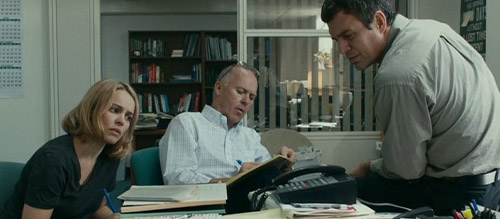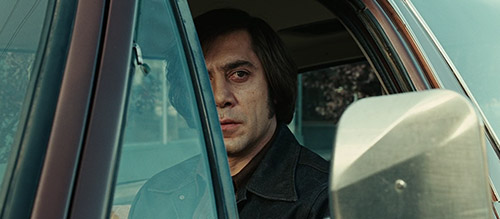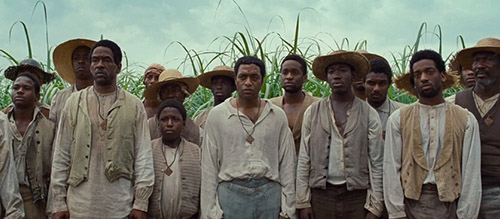21st Century Best Picture Oscar Winners Ranked
5. Moonlight – 2017
The other nominees: Arrival; Fences; Hacksaw Ridge; Hell or High Water; Hidden Figures; La La Land; Lion; Manchester by the Sea
It’s a crying shame that an Oscars Best Picture winner as deserving and exceptional as Moonlight will forever be tied to the narrative of how it was awarded the Oscar, because this reality seems to so blatantly overlook how this film’s release and win heralded in a new level of appreciation for a filmmaker it wouldn’t be hyperbolic to describe as a genius.
Made for a rumoured $3million, Moonlight is by far the lowest budget Best Picture winner in this list, and yet there isn’t a single moment of its runtime where this lack of funding seems to be in evidence; Barry Jenkins’ film is one of the truest Best Picture examples of “every frame is a painting”. What’s more is that the tone and rhythm of the filmmaking is one unto itself, the delicacy of so much of its spoken dialogue becoming a known feature of Jenkins’ work in the years that have followed. It’s a film that soaks through your skin, that clasps you gently in its palm, and yet it speaks so authentically to issues of race, class, sexuality and gender norms. It is dense yet easy to take in, political without losing touch of its heart or humanity. Whereas so many films that win Best Picture are issues films first and foremost, Moonlight is a human film then a political statement.
Whilst it is true that La La Land – the much more obvious Academy choice given its throwbacks to Hollywood’s Golden Era and musical format – was the name read aloud by Faye Dunaway during the controversial conclusion to the 2017 Oscars, and that the story of that year’s ceremony will likely forever be dominated by that moment, it is worth remembering the remarkable story of a low budget film about a black gay man winning the biggest prize in all of cinema.
4. Spotlight – 2016
Spotlight Review
The other nominees: The Big Short; Bridge of Spies; Brooklyn; Mad Max: Fury Road; The Martian; The Revenant; Room
In a year filled with “issues” movies, Spotlight rose to the top, its phenomenal telling of a press team from the Boston Globe uncovering child molestation within the Catholic Church being one of the best movies about investigative journalism in decades, its topic cutting right to the heart of a rancid truth that many hadn’t heard of even after the Globe went public with their information; one that spoke not only of local failings but of bigger picture issues regarding politics, the church and politics within the church.
Headlined by a fascinating ensemble including Supporting Actor and Supporting Actress nominees Mark Ruffalo and Rachel McAdams, as well as Michael Keaton who was well and truly into full stride on his comeback trail, Spotlight didn’t offer anything particularly noteworthy or outlandish in terms of its mise-en-scene, but what it did do was make a point of keeping the tragedy and injustice of the real-life stories at the forefront of the narrative it was presenting, offering a deeply upsetting insight into a real world problem in such an emotive way that a documentary couldn’t have so concisely established.
Throughout much of the 21st century, journalism has been under threat from any number of sources, including social media, would-be billionaire owners looking to control the narratives about themselves, and prominent politicians, and Spotlight was precisely the film needed to rebuke such a dissolution of one of our society’s most important assets. In celebrating Spotlight, The Academy of Motion Picture Arts & Sciences chose to celebrate the freedom of the press and highlighted a particularly pressing secretive issue within the US (and further, the world), whilst also staying true to the values of cinema in terms of exceptional filmmaking, particularly strong writing and performances.
3. No Country for Old Men – 2008
Top 10 Movies of 2007
The other nominees: Atonement; Juno; Michael Clayton; There Will Be Blood
2007 was one of the 21st century’s best years for cinema, and in winning the Best Picture above the likes of Juno and There Will Be Blood, the Coen Brothers’ No Country for Old Men solidified itself in history as the all-time great that it is.
Of all the films in Joel and Ethan Coen’s filmography, few have matched the ever-rising tension and perfect balancing of character goals and desires quite like this post-modern Western. Each scene here is stretched for every piece of tension the filmmakers can get, dialogue shifting perspective quicker than a snap of the fingers, the camera and editing working in unison to establish dominance or the lack thereof for each of its characters.
This is cinema that excels in every aspect, whether it be the direction, performances, screenwriting, cinematography, costume, etc. – there are few films as meticulously crafted and exceptionally constructed as this. The Coens won both the Adapted Screenplay and Director Oscars, as well as this Best Picture win, while Javier Bardem offered the best performance of his established and respected career to earn the Supporting Actor Oscar.
No Country for Old Men is violent and uncomfortable, but you can never take your eyes off it. It is exhausting but nourishing. In the decade-plus that has passed since its release, the impact of this timeless classic of the silver screen has yet to diminish and is unlikely to do so for decades to come. It may not speak of a moment in US political or social history, or be the “issues movie” that would typically make for a Best Picture choice, but it is a damn fine film that has to be amongst the very best of the films to ever win the award.
2. 12 Years a Slave – 2014
The other nominees: American Hustle; Captain Phillips; Dallas Buyers Club; Gravity; Her; Nebraska; Philomena; The Wolf of Wall Street
Scottish auteur Steve McQueen made Oscars history when 12 Years a Slave became the first film produced and directed by a black man to earn the Best Picture Academy Award. The win was one that signified a passing of the black historical narrative back to black people after decades of white people telling their stories, and thus the awards win marked an important moment in cinema history. The Academy would suffer a hangover of sorts, nominating all-white nominees the following year and thus becoming the subjects of a backlash against their perceived narrowmindedness, but history was made in 2014, and 12 Years a Slave will forever hold the accolade of being the first to push down its own particular barriers and signify true change regarding racial narratives within the film industry.
12 Years a Slave was up against possibly the best line-up of Best Picture candidates in years, and on the night it missed out on 6 of the 9 awards it was nominated for (including Best Actor and Best Director), but history has shown that McQueen’s film was not only the important choice on the night, but the right one; the film itself remains the most noteworthy aspect of its historical win, it being one of the great films of the 2010s in every conceivable way.
As McQueen had already developed a reputation for with his work on Hunger and Shame, 12 Years a Slave was characteristically pristine, as if surgically constructed. Every shot was like a photograph you could hang in a museum, and the blocking of action in each of the film’s major moments of tension was simply unmissable. The performances were astonishing, with Chiwetel Ejiofor arriving at the height of the form from out of nowhere and Lupita Nyong’o quickly making herself a go-to name for major roles in the decade to come, whilst the editing, make-up and costumes were each particularly noteworthy in their own right.
Cinema has rarely felt this important, and even when it has there have been few occasions that these important films have been as great as 12 Years a Slave, one of the most exceptional Best Picture winners of the 21st century.
Recommended for you: 100 Greatest Films of the 2010s
1. Parasite – 2020
2020 Oscars Best Picture Nominees Ranked
The other nominees: Ford v Ferrari; The Irishman; Jojo Rabbit; Joker; Little Women; Marriage Story; 1917; Once Upon a Time in Hollywood
There are few movies that become classics the moment they’re released, but Parasite is one.
Evoking the films of Michael Haneke, Park Chan-wook and perhaps most obviously Alfred Hitchcock, director Bong Joon-ho constructed a layered spectacle that balanced comedy, thrills and political intention as good if not better than the historical masters of the form. This was a tale that was wholly South Korean but internationally relatable, a movie that could make you laugh and cry before getting you to fill with righteous anger at the unfair machinations of our world.
Making history as the first Best Picture winner to be made in a language other than English, this South Korean film blew open the floodgates for more international feature film recognition within The Academy and thus the wider North American film sphere. As winner of Best Picture, Best Director, Best Screenplay and Best International Feature, Parasite cleaned up the four so-called “big” awards, adding the collection to the Palme d’Or it had received at Cannes the previous year and certifying itself as the number one movie in world cinema.
A rich experience in every aspect, Parasite is one of the more rewatchable Best Picture winners in history; a film that is not only particularly relevant to our era of widening wealth gaps and the prejudices that cause division amongst us, but in of itself a piece of art that makes the best of the techniques of those who have come before and is elevated by a distinct authorial voice of the most profound and spectacular variety.
In the 21st century there are few films that can compare to Parasite in terms of quality, and in winning Best Picture as a South Korean production there are few that can rival its wider importance. Parasite is the height of cinema, and it represents the height of what the Oscars can do by recognising such; the perfect example of what a Best Picture winner should be; the best of the Best Picture winners this century.
Recommended for you: Bong Joon-ho Films Ranked
The Oscars have long been the source of controversy and divisive opinions. In a form like cinema, that is so subjective and debatable, it is unlikely that this will ever change. What can be developed is the move away from the “Best Picture formula” and a continued diversifying of the voting parties. Dwindling ratings may suggest a downturn in The Academy of Motion Picture Arts & Sciences’ influence over the medium, but The Oscars remain the most popular platform for cinema celebration, the biggest springboard for film discussion, and thus maintain their importance to (and within) the art form.
Which Best Picture winner most won your heart? Would you rate your favourite Best Picture winner as also being the best? Let us know in the comments, and be sure to follow @thefilmagazine on Instagram, Twitter and Facebook for more articles like this one.
Updated to include Everything Everywhere All at Once 30th January 2024. Originally published 6th April 2021.






